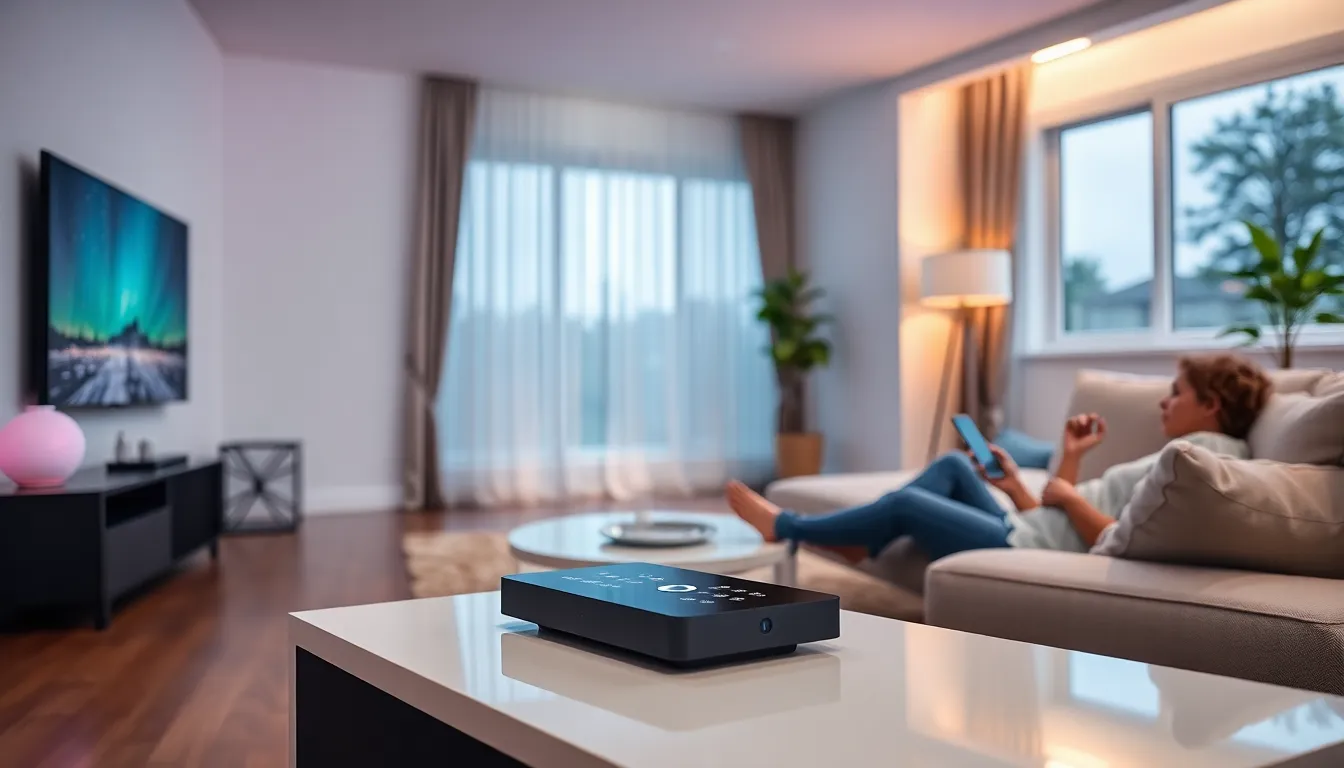Table of Contents
ToggleIn a world where even toasters are getting smarter, the smart home installation business is booming faster than you can say “Alexa, turn on the lights!” Homeowners are trading in their old gadgets for cutting-edge technology that makes life easier, safer, and a whole lot cooler. Imagine controlling your entire home with just a tap on your phone or a friendly voice command. Sounds like magic, right?
Overview of Smart Home Installation Business
The smart home installation business has rapidly expanded in recent years. Homeowners increasingly invest in state-of-the-art technology that improves convenience, safety, and comfort. Smart devices commonly include security cameras, smart thermostats, and lighting systems, all designed to integrate seamlessly with one another.
Smart home technology offers numerous benefits. Security enhancements provide peace of mind, while energy management solutions lower utility costs. Many homeowners appreciate the ability to control their devices through smartphone apps or voice commands, making life easier.
Industry data indicates that the smart home market has shown significant growth. In 2022, the global smart home market was valued at approximately $80 billion and is projected to reach over $135 billion by 2025. This rise presents substantial opportunities for businesses in this sector.
Installers play a crucial role in the transformation of homes. They provide expert guidance on selecting devices that suit individual needs and preferences. Additionally, experienced technicians ensure proper installation and integration, which optimizes device functionality and reliability.
When considering a smart home installation business, understanding customer education proves essential. Many customers require assistance navigating new technology and learning how to use various devices effectively. Comprehensive service offerings can enhance customer satisfaction and encourage repeat business.
Overall, the smart home installation business represents a dynamic and lucrative sector. Focusing on innovation and customer service allows companies to thrive as the demand for smart home solutions continues to rise.
Benefits of Smart Home Technology

Smart home technology offers numerous advantages for homeowners. Users experience an elevated lifestyle through enhanced functionality and ease.
Increased Convenience
Convenient control characterizes smart home systems. Homeowners benefit from smartphone apps or voice commands to manage devices. Activities like adjusting lighting, heating, or security settings occur effortlessly. Devices can also automate routines, such as scheduling lights to turn on at dusk and off at dawn. Greater accessibility is apparent, especially for individuals with mobility challenges. Increased control simplifies daily tasks and maximizes comfort levels.
Enhanced Security
Enhanced security features are pivotal in smart home technology. Homeowners enjoy real-time monitoring through smart security cameras and sensors. Alerts sent to smartphones notify users of unusual activity or potential threats. In addition, smart locks offer remote access control, reducing the risk of unauthorized entry. Many systems integrate seamlessly with local law enforcement, facilitating rapid responses. Overall, this advanced layer of security fosters peace of mind for families and individuals alike.
Key Components of a Smart Home System
Smart home systems consist of various components that work together to enhance convenience, security, and efficiency in daily living. Understanding these elements is essential for effective installation and customer satisfaction.
Smart Lighting Solutions
Smart lighting solutions enable homeowners to control lights remotely or automate schedules. Through apps or voice commands, users can adjust brightness and color temperature to suit different moods. Additionally, energy-saving features contribute to lower electricity bills, as smart bulbs often use less energy compared to traditional bulbs. Motion sensors may automate lighting in specific areas, ensuring lights turn on or off as needed. Many smart lighting systems also offer integration with other smart devices, enhancing the overall user experience.
Smart Thermostats
Smart thermostats provide precise control over home heating and cooling systems. These devices learn user preferences over time, adjusting temperatures automatically for optimal comfort and energy savings. Homeowners can access these thermostats remotely, making adjustments through smartphone apps from anywhere. Energy consumption reports help users identify ways to save on utility bills. Some models even integrate with weather forecasts, optimizing energy use based on external conditions. This level of customization results in a more comfortable living environment while reducing overall energy costs.
Home Security Systems
Home security systems enhance safety through real-time monitoring and remote access features. Smart cameras allow homeowners to view live video feeds from their properties, receiving alerts for unusual activity. Integration with smart locks provides secure access management, enabling users to grant entry to visitors remotely. Sensors can detect movement and alert homeowners of potential intrusions or emergencies. Additionally, some systems integrate with local authorities, ensuring quick responses to threats. These advanced security solutions significantly enhance peace of mind for homeowners and their families.
Starting a Smart Home Installation Business
Entering the smart home installation business offers exciting opportunities. Rapid advancements in technology lead to increased demand for smart home solutions.
Market Research and Target Audience
Understanding market dynamics proves essential. Target homeowners eager to upgrade their living spaces. Age demographics primarily include 25 to 50-year-olds, who are tech-savvy and inclined to invest in home automation. Exploring local market demands helps identify preferred products and services. Engaging with potential customers through surveys or community events builds rapport and insights into preferences. Growth in the smart home market, projected to exceed $135 billion by 2025, indicates substantial potential for installers.
Necessary Skills and Certifications
Specific skills enhance credibility in this industry. Proficiency in electronics, networking, and basic programming becomes crucial. Communication skills foster positive interactions with clients, guiding them through options and installations. Obtaining relevant certifications, such as those from Electronics Technicians Association or CEDIA, strengthens installer qualifications. Furthermore, hands-on experience through internships or part-time work in related fields builds confidence and expertise. Continuous education on emerging technologies remains vital for staying competitive.
Initial Investment and Funding
Calculating initial costs lays a solid foundation. Required investments typically include tools, inventory, and marketing expenses. Budgeting around $10,000 to $30,000 often covers essential setups, depending on business scope. Exploring funding options, such as small business loans or grants from local initiatives, provides additional financial support. Building relationships with suppliers also allows for favorable pricing and flexible payment terms. Understanding return on investment plays a key role in ensuring business sustainability.
Marketing Strategies for Smart Home Installation Services
Effective marketing strategies can significantly enhance visibility and attract customers in the smart home installation business.
Digital Marketing Techniques
Digital marketing techniques play a crucial role in reaching potential customers. Using search engine optimization improves website rankings, making it easier for homeowners to find services online. Social media advertising targeted at tech-savvy demographics allows businesses to engage directly with potential clients and showcase innovative installations. Content marketing, including blogs and videos, can educate consumers on the benefits of smart home solutions, establishing authority in the market. Email campaigns nurture leads by providing information on new products, promotions, and tips for optimizing smart home technology. These strategies collectively drive traffic and generate leads in a competitive landscape.
Networking and Partnerships
Networking and partnerships can significantly expand a smart home installation business’s reach. Collaborating with real estate agents and builders can create referral opportunities during home purchases or renovations. Local technology retailers can also serve as valuable partners, offering packages that combine installations with product sales. Attending trade shows or local home improvement expos enables businesses to connect with homeowners and other industry professionals. Establishing relationships with other service providers, like electricians and plumbers, may create avenues for joint ventures, enhancing service offerings. These connections foster a supportive ecosystem that can drive growth and awareness in the community.
Challenges in the Smart Home Installation Business
Smart home installation comes with its unique set of challenges. These hurdles can impact the efficiency and success of the business.
Technical Common Issues
Common technical issues often arise during installations. Connectivity problems between devices create frustration for both installers and homeowners. Compatibility issues can also surface, especially when integrating devices from different manufacturers. Installers frequently encounter difficulties in app configuration, which can delay the setup process. Firmware updates often present another challenge, as they are necessary to unlock new features and improvements. Troubleshooting hardware malfunctions becomes essential, as faulty devices may lead to dissatisfaction. Addressing these technical challenges requires continuous training and a strong understanding of various technologies.
Navigating Customer Expectations
Managing customer expectations is vital in the smart home installation business. Many homeowners expect seamless integration and quick setup times. Misunderstandings regarding device capabilities can lead to disappointment. Carefully explaining features and limitations before installation helps align expectations. Providing personalized consultations ensures clients understand their specific needs and preferences. Regular updates during the installation process keep customers informed and engaged. Offering ongoing support after installation fosters trust and encourages repeat business. Emphasizing clear communication allows installers to strengthen their relationships with clients.
The smart home installation business stands at the forefront of innovation and convenience. As technology continues to evolve homeowners increasingly seek solutions that enhance their lifestyles. This sector not only offers lucrative opportunities for entrepreneurs but also plays a crucial role in transforming everyday living into a seamless experience. With the right skills and strategies in place installers can build lasting relationships with clients while navigating the challenges of this dynamic market. Embracing ongoing education and effective communication will ensure customer satisfaction and drive growth in this thriving industry.






